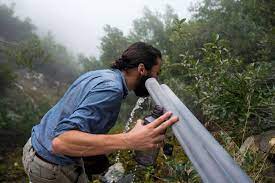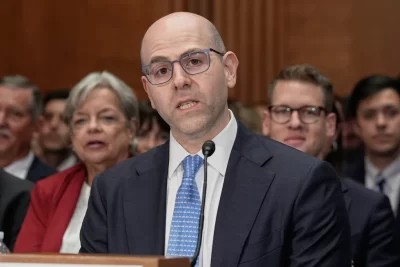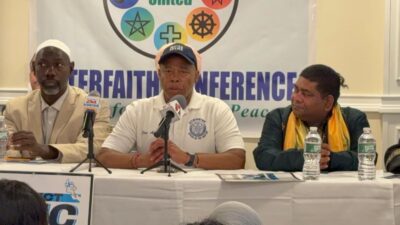
California regulators on Tuesday ordered the company that owns Arrowhead bottled water to stop using some of the natural springs it has relied on for more than a century, a victory for community groups who have said for years that the practice has drained an important creek that is a habitat for wildlife and helps protect the area from wildfires.
Arrowhead bottled water traces its roots to a hotel at the base of the San Bernardino Mountains that first opened in 1885 and began selling bottled spring water from its basement in 1906. But environmental and community groups say the company has never had permission to take water from the springs, which flow through the San Bernardino National Forest on public lands.
On Tuesday, after eight years of wrangling that included dozens of hearings, the State Water Resources Control Board agreed that BlueTriton — the company that owns the Arrowhead brand — does not have permission to use the water and ordered them to stop. The order does not ban the company from taking any water from the mountain, but it significantly reduces how much it can take.
“I understand a huge amount of money and business is at stake,” board member Laurel Firestone said. “It also is important for us that no matter how much money is involved that we are going to ensure that the laws of our state are upheld and that they apply to everybody.”
BlueTriton Brands issued a statement after the vote indicating it would sue to block the order, vowing to “vigorously defend our water rights through available legal process.”
And it’s not the first challenge against bottled water companies, either from consumer advocates or groups fighting against plastic waste. The U.S. Interior Department said earlier this year it would phase out the sale of all plastic water bottles in national parks. Poland Springs, also owned by BlueTriton, has faced lawsuits claiming its water doesn’t come from a spring.
Lawyers for BlueTriton said Tuesday there is ample evidence the company and its predecessors have been using the springs since well before 1914, when the state began regulating how people can use water. They argue that gives them seniority to use the springs under California’s complex water rights system.
The company also points to a 1931 court case that they say proves they have a legal right to use the springs — a ruling that went unchallenged for decades.
Beyond those arguments, BlueTriton’s lawyers spent most of Tuesday’s hearing arguing California regulators don’t have the power to tell them what to do. They said the company actually takes water that is underground and hasn’t reached the surface. That’s an important distinction because the State Water Resources Control Board does not have the authority to regulate certain types of groundwater.
But regulators were unmoved. They said the company’s claim dates to 1929, meaning it does not have seniority under California’s water rights law. They said the 1931 court case merely settled a dispute between two parties and was not a declaration that the company had a right to use the water from the springs. And they said state regulators were well within their rights to order the company to stop using them.
“The last thing we want is for someone diverting water from a spring to evade the state’s water right rules by using a tunnel, borehole or similar method to intercept water that otherwise would have discharged from the spring into a stream,” said Ken Petruzzelli, the lead attorney on the case for the State Water Resources Control Board.
The vote was a triumph for a small band of community residents who have been fighting the company for years. They include Amanda Frye, a resident of Redlands who has spent countless hours combing through documents to investigate the case. She said when hiking the mountain, she can see BlueTriton’s pipes gushing with water as they run along the dry bed of Strawberry Creek.
“Strawberry Creek can no longer support fish,” she said. “Essentially they inserted a straw into each spring and diverted it down the mountain to their trucks to take it away.”
Brendan O’Rourke, who manages BlueTriton’s natural resource team, testified that the company’s guiding principle has been long-term sustainability. He also said the company has donated tens of thousands of bottled water for disaster relief efforts, including the Maui wildfire this year and the 2018 Camp Fire that mostly destroyed the town of Paradise.
“We take our jobs as stewards of the environment very seriously. We have a track record to prove it,” said Rita Maguire, one of BlueTriton’s attorneys and the former director of the Arizona Department of Water Resources.
__
Taxin reported from Orange County, Calif.






